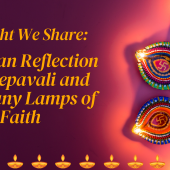People of Light

December 29, Friday The Fifth Day in the Octave of Christmas
Daily Readings: First reading: 1John 2: 3 – 11: Gospel: Luke 2: 22 – 35
Darkness and light are two recurrent metaphors in the Bible. Light symbolizes the forces of goodness and positivity. God, as the Supreme Goodness, is symbolized as the Light. For example, in the OT period, God’s presence was known as ‘shekhina’ which can be translated as ‘light’ or ‘radiance’.
Darkness, on the other hand, symbolizes the forces of evil and negativity. Saints like Teresa of Avila and John of the Cross speak of darkness in our spiritual journey, during which we don’t much experience the presence of God in our lives. St. Paul uses this metaphor of darkness and night to describe a sinful way of life, away from God, and the metaphor of light to describe God and His presence.
In the first reading, St. John uses the metaphor of light and darkness to refer respectively to those who love and who hate: “Whoever loves a brother or sister lives in the light...But whoever hates another believer is in the darkness."
In the gospel, Simeon calls Jesus “a light for revelation to the Gentiles.” It is noteworthy that the feast of Christmas, in whose season we are, is also called the ‘Feast of Light.’
As Christians, we are called to follow Jesus, who said, “I am the light of the world” (Jn 8:32). The very same Jesus also said, “You are the light of the world (Mt 5:14). Being the people of light means (i) to love those who are around us, especially those whom we consider alien; (ii) to follow God’s commandments; and (iii) to have an illumined mindset. “Thamasoma jyotir gamaya” is a prayer the ancient Indian risis prayed every day.
It means, “O Lord, lead me from darkness to light.’ As long as our hearts are filled with hate and bitterness, we remain in darkness. So moving from darkness to light means moving from hate to love, from revenge to forgiveness, from indifference to involvement, from negativity to positivity, and so on. May our lives be filled with love and light.
Radio Veritas Asia (RVA), a media platform of the Catholic Church, aims to share Christ. RVA started in 1969 as a continental Catholic radio station to serve Asian countries in their respective local language, thus earning the tag “the Voice of Asian Christianity.” Responding to the emerging context, RVA embraced media platforms to connect with the global Asian audience via its 21 language websites and various social media platforms.














